Giving and Receiving
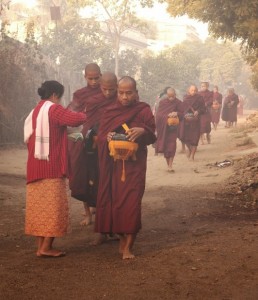
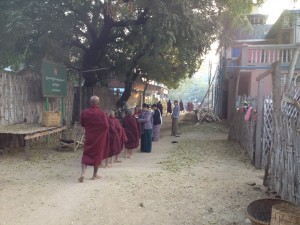
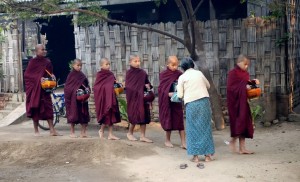 I think the thing about the trip that has made the deepest…and I hope the most lasting…impression on me was being immersed in the culture of generosity that seems to be at the core of the Burmese way of life.
I think the thing about the trip that has made the deepest…and I hope the most lasting…impression on me was being immersed in the culture of generosity that seems to be at the core of the Burmese way of life.
I mentioned in my first post that one of the highlights was following the monks on their daily alms round. The villagers get up at 4am to make rice to offer to the monks. They are, literally, dirt poor and yet they seem to have such a sense of dignity and self-respect, even joy, when offering their spoonful of rice. And, just as important, the monks display this same sense of dignity and respect. The giving is honored, and so is the receiving. There is no shame or embarrassment or sense of entitlement in the receiving. And no resentment or obligation or guilty sense of having to do one’s duty in the giving. Not even an implied exchange…in the sense of “I’ll do this for you, so you’ll do that for me.” Both sides are participating equally and wholeheartedly in what can only be described as a sacred act.
Our group got to experience that mutual flow of generosity when we stayed at the Shwe Oo Min monastery. Food, lodgings, teachings…everything was offered freely. We all planned to make a donation, of course, but there really was not a sense that this was expected. You could come and stay and eat and sleep–and meditate, or not–and it was all offered without asking for anything back.
But things cost money, of course. So visiting yogis, as well as local supporters, would donate money for the food, or for operating expenses, or whatever. There were no fees. But there was recognition…and great joy…in the receiving.
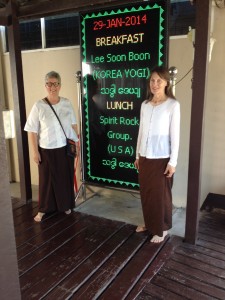
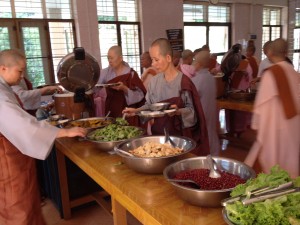
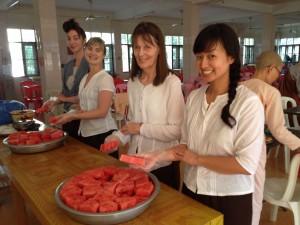
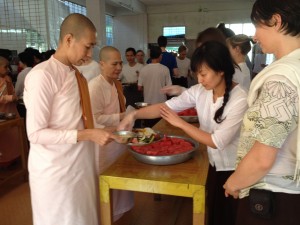 So our group –which had come to be called the Spirit Rock Group by U Tejaniya– decided to pool our planned donation and give it all together as an offering for one of the meals. It cost $200 to feed everyone from breakfast (there were about 200 people in residence at the monastery) and $400 for lunch. The practice of generosity is so pervasive that all the breakfasts in February and all but two of the lunches were already paid for!
So our group –which had come to be called the Spirit Rock Group by U Tejaniya– decided to pool our planned donation and give it all together as an offering for one of the meals. It cost $200 to feed everyone from breakfast (there were about 200 people in residence at the monastery) and $400 for lunch. The practice of generosity is so pervasive that all the breakfasts in February and all but two of the lunches were already paid for!
So we quickly signed up for one of the open lunch days. We thought that that was all we would do…but no, we were told that a gift is something that is done by thought, word and deed. We had done the thought by deciding to make the gift, but we also needed to make a bodily action (the deed) by physically placing the food (or at least, a symbolic portion of it) into the bowl (plate) of those receiving, and in the case of the monks, we needed to recited (silently) a phrase (in Pali), which meant something like “may this offering be a cause and condition for my realization of nibbana.” (Now that’s pretty heavy.)
In my “normal” Wester way of thinking, I would have preferred to give my donation anonymously, or at least quietly and unobtrusively. I would have felt a little uncomfortable giving it with fanfare–the “wealthy” Westerner giving money to the “poor” Burmese monastery. Or I would have felt that it was simply a fee-for-serivce arrangement, no big deal, certainly nothing to celebrate.
But that’s not how the Burmese see it! They put our name up on a 6-foot light board that every one had to pass by as they went into the dining hall. And before that, they had us put the food on the monks table, and the rice directly into their bowls, and then they put us up-front-and-center, so we could publicly place the desert (watermelon) on everyone’s plate.
Everyone was joyous….not to be getting the food, but to be getting to be a part of our act of generosity. And I have to say, it was truly a joy and a pleasure to be able to give in that way!!!
